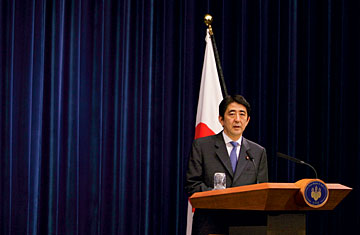
After stubbornly rebuffing calls for his resignation, Abe abruptly reversed course on Sept. 12 and announced he'll relinquish the prime ministership
He blinked back tears, and his voice wavered. Unable to parry reporters' queries, Japan's Prime Minister Shinzo Abe let drawn-out pauses speak more loudly than his choked words. For a man who had staked his reputation on being the tough guy who would transform his homeland into a self-confident nation with a military worthy of its economic might, the end had come with a whimper. But even stranger was the reason Abe gave during a Sept. 12 speech announcing his intent to step down as Japan's leader. In his tumultuous yearlong tenure, Abe weathered a stunning parliamentary defeat for his ruling Liberal Democratic Party (LDP) coalition, the resignations of four of his Cabinet members, the suicide of his corruption-tainted Agriculture Minister and a scandal over the mishandling of more than 50 million pension-fund accounts. None of these crises, Abe maintained, directly prompted his plans to depart once the LDP chooses a new PM next week. Instead, Abe put most of the blame on a snub by one man: opposition leader Ichiro Ozawa, whom the PM claimed had refused to meet to discuss a stalemate over whether Japan would continue to refuel American military vessels participating in the U.S.-led war on terror. "Even though I had requested a party-leader talk, Ozawa rejected my overture," said Abe in his resignation speech, implying that this deadlock somehow had the power to derail a prime ministership that had weathered far worse. "Japan must continue its fight against terrorism under a new Prime Minister."
What a comedown for a man who drew leadership inspiration from his grand-father, a staunch nationalist who bounced back from imprisonment as a war criminal to become Premier in the 1950s. The youngest Prime Minister in postwar Japanese history, Abe came to power last September as the architect of a self-proclaimed "assertive diplomacy" in which a re-energized nation would claim its rightful place on the global stage. The 52-year-old vowed to repair relations with Asian neighbors still wounded by Japan's wartime aggression and aimed to transform the nation's military from a limited self-defense force into a proper army. It was an ambitious agenda that, if successful, would have reminded East Asia that China would not be able to determine the region's future alone. After its lost postbubble decade, Japan, Abe seemed to be saying — with the most developed economy in Asia and with mature democratic institutions — would help shape the Asian century.
In some ways, he succeeded. Abe mended fences with China and South Korea. He set up a legal framework to amend the constitution, which includes clauses that currently keep Japan's army from active participation in combat.
Yet for all his ambitious foreign-policy goals, Abe was undone by far more prosaic domestic concerns. According to results of a government survey released on Sept. 8, what the Japanese most wanted from their leaders were medical and pension reform, better elderly care and more jobs. A commitment to defense and regional security was low on the list, lagging even behind worries over Japan's declining birth rate. Abe didn't appear to sense the country's preoccupation with bread-and-butter economic issues. Even though Japan has finally crept out of recession, the PM failed to address a perception that only corporate fat cats were profiting from the recovery. On July 29, the public delivered its verdict at the polls. For the first time in 52 years, opposition forces led by Ozawa's Democratic Party of Japan (DPJ) wrested control of the Upper House of the Diet, Japan's parliament, from the LDP. The drubbing echoed a lesson that former U.S. President George H.W. Bush learned back in 1992 when he was booted from office. "It's the economy, stupid," says Richard Katz, the New York–based editor of the Oriental Economist Report. "Up until his very last day, Abe showed just how out of touch he was."
Indeed, until the end Abe continued to beat the foreign-policy drum without acknowledging the primary cause of his dismal approval ratings. On Sept. 9, while hobnobbing with other international leaders at this year's Asia-Pacific Economic Cooperation summit in Sydney, Japan's Premier laid down a surprising ultimatum: he would resign if parliament did not extend legislation allowing the Japanese navy to refuel American ships supporting military operations in Afghanistan past a Nov. 1 deadline. Abe argued that the DPJ's opposition to the naval commitment would only reinforce Japan's image as an immature global power unwilling to pull its weight. Ozawa retorted that the mission breached the constitution.
The fight promised to be ugly, but the issue would have taken weeks — if not months — to work its way through the Diet. So why did Abe, only three days after promising to fight on, decide to throw in the towel? Plagued by rumors of chronic ill health, he looked exhausted in the days before his resignation announcement. "Abe broke under the pressure," says Norihiko Narita, a politics professor at Surugadai University near Tokyo. "The weight of his responsibilities was just too much." For his part, Ozawa expressed bewilderment over the about-face. "I have been in politics nearly 40 years, and this is the first time I've seen a case like this," he said. "I actually have no idea what's on Abe's mind."
